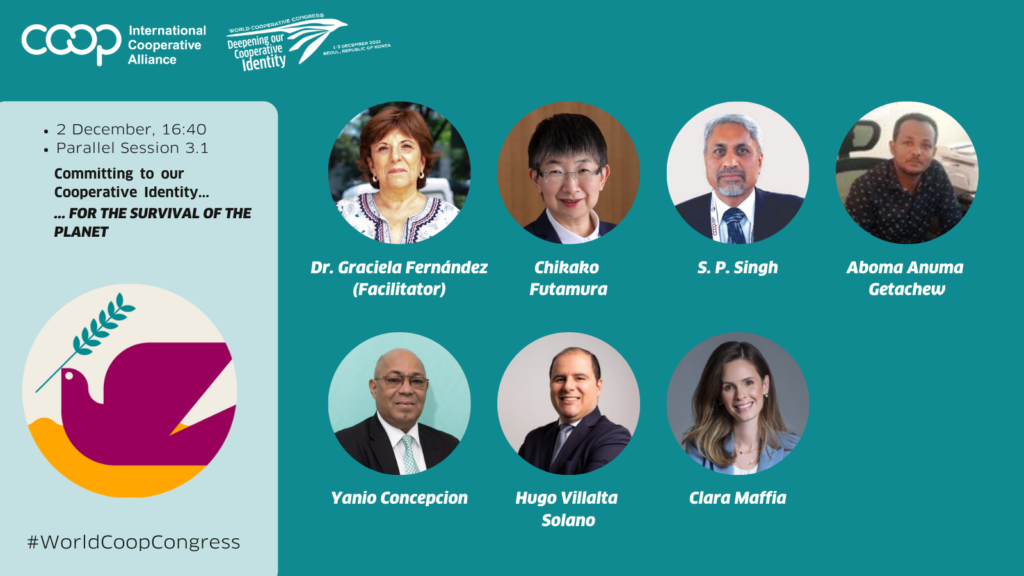
Delegates to the World Cooperative Congress on the second day discussed one of the most important issues facing us all – the survival of the planet, in particular action on climate change. The session was chaired by Graciela Fernandez, President of the Cooperatives of the Americas and ICA Board Director, who is based in Uruguay. She started by saying that everyone should reflect on COP26 in Glasgow which was a red alert to the planet and was a warning to us all that we must change the way we do business.
Clara Maffia, Director of the Institutional Relation at the OCB, the national apex organization for the cooperative movement in Brazil, said coops were vital for tackling climate change as they represented a large part of the business community, especially in many developing countries. In Brazil they are making a significant contribution to stopping deforestation, a major driver of climate change. She explained: “The OCB has a membership of 4868 cooperatives representing 17 million members. They are very diverse from livestock coops to credit coops. We are currently working with small farmers who export to over 100 countries. We are also working with the government who have introduced a new Forestry Code which states all farmers must preserve 20-80% of their land depending on where they are located.” She added that jointly with the government, OCB had held over 200 workshops for thousands of farmers to help them understand the code.
The session also heard from Chikako Futamura, the Executive Director of the Japanese Consumers’ Cooperative Union. It was founded in 1951 and now has 29.6million members with a turnover of 3.8 trillion yen. “In 2017 we adopted a Co-op Action Plan for the SDGs,” he said. “We also ran campaigns from charging for plastic bags to promoting feed-in tariffs for renewable energy. Our aim is to reduce CO2 emissions by 40% by 2030 compared to 2013.”
Aboma Anuma Getachew, Capacity Building and Cooperative Support Senior Expert for the Oromia Coffee Farmers’ Cooperative Union, based in Ethiopia, talked about how developing countries with little infrastructure are tackling climate change through empowering women. “Throughout most of my country there is no access to a central grid so people use diesel generators for electricity and firewood for cooking,” he said. In response to this, OCFCU had been training women in using renewable energy such as solar panels by creating women ambassadors who champion renewable energy technologies in their communities.
Mr S.P. Singh, the Managing Director of Indian Farm Forestry Development Cooperative Ltd. (IFFDC), talked about how India is increasing its forest cover to help meet its CO2 targets. He highlighted how 22% of India is now forest, which equates to sequestering nearly 30 billion tonnes of CO2. India’s intended Nationally Determined Contribution is 2.5-3 billion tonnes additionally of CO2 sequestration using forests by 2030. “This will require over 166,000 square kilometres of new forest cover,” he said. “To do this we will be developing forestry on wastelands, capacity building with forestry cooperatives and introducing fast-growing tree species as part of an agro-forestry programme.” He added that the would be an increasingly important role of women in these projects.
Yanio Concepcion, President of Cooperativa Vega Real in the Dominican Republic, talked about how small island states can make a contribution to tackling climate change. CVR works with over 500 communities to conserve water and has organised its own congress on environmental challenges in the Dominion Republic. This was based on each community’s ecological footprint. Mr Concepion added “We have also introduced green schools, will plant 10,000 trees, have organised ecological clean-ups and created the first eco park.”
Delegates also heard from Hugo Villalta, the Business Director of CoopeServidores in Costa Rica. The CS team works with over 700 cooperators across Costa Rica. “We launched an insurance cooperative in 2018, Nova Hub in 2019 – the first in Latin America and a sustainability roadmap back in 2010, all of which are now paying real dividends in terms of climate change,” he said.
